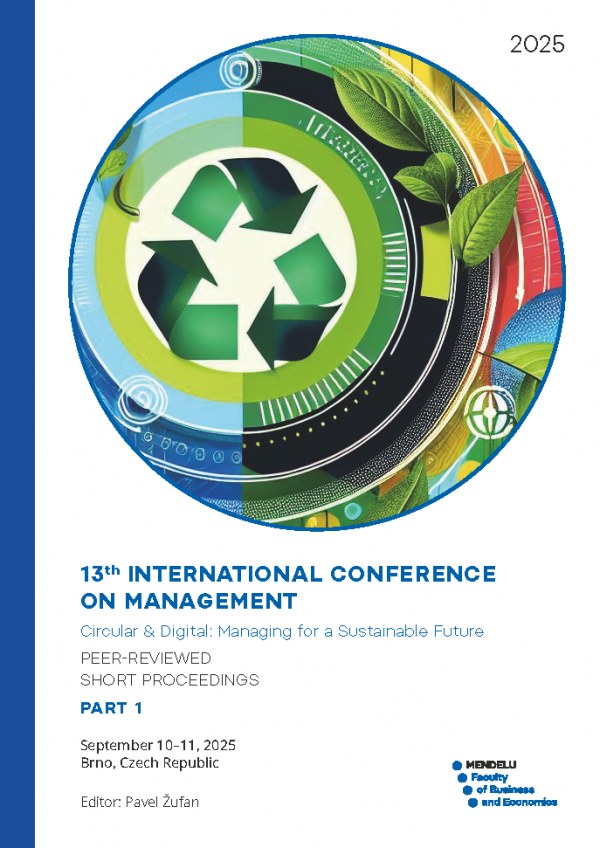
DOI: 10.11118/978-80-7701-042-9-0044
INNOVATION AND KNOWLEDGE TRANSFER IN AGRICULTURE: THE ROLE OF THE AKIS SYSTEM FOR SUSTAINABLE DEVELOPMENT
- Ágnes Jakab1, András Vér2, Csaba Bálint Illés1
- 1 John von Neumann University Doctoral School of Management and Business Administration, Infopark sétány 1., Budapest, Hungary
- 2 Albert Kázmér Faculty of Agricultural and Food Sciences of Széchenyi István University, Mosonmagyaróvár, Vár tér 2., Hungary
Agricultural innovation and knowledge transfer are vital for sustainable development and global food security. Challenges like population growth, climate change, and limited resources demand ongoing agricultural development and new technologies. Sustainable innovation is crucial for productivity and competitiveness. The Agricultural Knowledge and Innovation System (AKIS) is central to sharing innovation and knowledge transfer. Researchers, farmers, advisors, and institutions collaborate to implement new scientific and technological advancements. Advisors are key in translating knowledge into practice. Research shows many advisors are involved in national or international cooperation, but more incentives are needed to boost participation. Collaboration with universities, research institutes, and industry enhances innovation but requires better international integration. Challenges include limited information, resources, and institutional support, which targeted training and programs can address. Most advisor-led innovation experiments occur on farms, allowing direct technology testing. However, controlled experimentation is lacking, potentially hindering improvement effectiveness. Promoting such experimentation and enhancing demonstration farms can speed up innovation adoption. In summary, effective innovation diffusion requires stronger knowledge transfer and advisor roles. Continuous training, collaboration, and supportive mechanisms are vital for advancing agricultural innovation. Strengthening the AKIS system and integrating digital technologies are essential for developing a sustainable, competitive agricultural sector.
Keywords: agricultural innovation, knowledge transfer, advisory servicies, AKIS
pages: 44-46, online: 2025
References
- Meadows, D. H., Randers, J., Meadows, D. L. 2013. The limits to growth. In The Future of Nature. New Haven: Yale University Press, pp. 101-116.
 Go to original source...
Go to original source... - Gu, D., Andreev, K., Dupre, M. E. 2021. Major trends in population growth around the world. China CDC Weekly. 3(28), 604-613.
 Go to original source...
Go to original source... - Dunay, A., Károlyi, H. 2024. Are Human Resources the Engine of Innovation? An Analysis through the Lens of Disruptive Innovation. In: Mérleg és kihívások - Értékteremtés - Fenntarthatóság - Digitalizáció. Miskolc, Hungary, pp. 608-616.
- Prager K., Creaney R., Lorenzo-Arribas, A. 2014. Advisory services in the United Kingdom: exploring' fit for purpose' criteria. Scotland UK: The James Hutton Institute.
- Kountios, G., Kanakaris, S., Moulogianni, C., Bournaris, T. 2024. Strengthening AKIS for Sustainable Agricultural Features: Insights and Innovations from the European Union: A Literature Review. Sustainability. 16(16), 1-27.
 Go to original source...
Go to original source... - Gáborné, J. Á., Varga, Zs., Vér, A. 2020. AKIS and advisory services in Hungary. Report for the AKIS inventory of the i2connect project. i2connect-h2020.eu. https://i2connect-h2020.eu/resources/akis-country-reports/
- Jakab, Á, Dunay, A. 2024. Tudásátadás az agráriumban - a magyar és a lengyel agrártudás és innovációs rendszer szereplői és működése. Gazdálkodás. 68(6), 1-12.
 Go to original source...
Go to original source...


